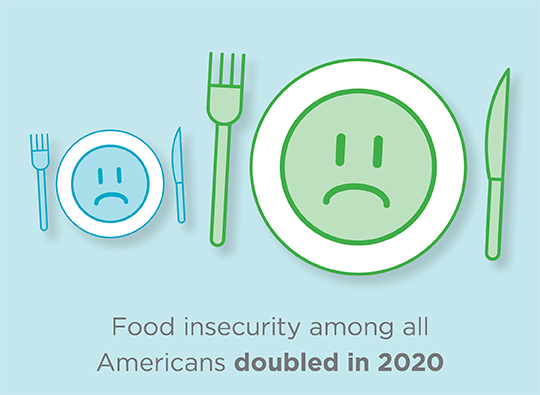A healthy smile does more than just make you look and feel your best — it’s a way to brighten others’ days and spread joy! While brushing and flossing are important for keeping your teeth in tip-top shape, proper diet and nutrition are also key to protecting your smile from the inside, out.
As part of National Smile Month, we want to highlight the ways in which food insecurity is affecting the oral and overall health of Americans and why good oral health and diet go hand in hand.
Need a dentist but not sure where to start? With our “Find A Dentist” tool, you can search for a provider based on factors that are important to you.
Find A Dentist
What is food insecurity?
The USDA defines food insecurity as a lack of consistent access to enough food to live a healthy life. The issue, however, isn’t so cut and dry – food insecurity spans lifestyles and socioeconomic statuses and ranges from total access to high quality, nutritious food (otherwise known as high food security) to skipped meals and reduced intake of food (known as very low food security).
For some, food security almost always ties back to finances or physical accessibility to quality food sources, i.e. grocery stores vs. fast food restaurants.
The USDA defines a “food desert” as an area where a large portion of individuals living at or below the poverty line lack access grocery stores or other fresh food sources due to proximity or lack of financial resources.
People living in food deserts, for example, may only have access to convenience stores, which typically don’t carry fresh produce or meat, or might turn to fast food for a majority of their meals. This diet is often higher in fat, sugar, sodium, and simple carbohydrates and can lead to high cholesterol, malnutrition, diabetes, and variety of other health problems, including tooth decay.
Why is proper nutrition important for your oral health?
When people don’t have access to nutritious foods, they’re often deficient in the vitamins, minerals, and nutrients needed to live a healthy life. And without proper nutrition, the body lacks the fuel it needs to thrive.
The benefits of a healthy diet and nutrition education are vast — for children and adults alike. Dietetics, the science of how food and nutrition affect our health, tells us that good nutrition helps us maintain a healthy weight, reduces the risk of diseases, reduces high blood pressure and high cholesterol, improves immune response, and increases our energy levels. We lose out on all these benefits with a poor diet, and ultimately our oral health suffers too.
Nutrient deficiencies can affect nearly every structure in the mouth, contributing to everything from enamel loss to bad breath. And according to the American Dental Association, what we eat has a direct effect on the health of the tissues in our mouth and our teeth.
Diets high in sugar, for example, have been associated with a greater risk of cavities — a problem that occurs more frequently but is often left untreated in those suffering from food insecurity. This can lead to dental erosion and periodontal disease — an advanced form of gum disease that affects the health of your mouth and can lead to a host of other health problems.
How has the pandemic affected food security?
Food insecurity isn’t new – in fact, a report from the USDA estimates that around 10.5% of American households were food insecure in 2019. But with increased job losses, reduced working hours, school closures (and with them school lunch programs), the pandemic has had an unprecedented impact on food insecurity across the country.
According to researchers at Northwestern University, food insecurity among all Americans doubled in 2020. And for families with children, that impact tripled, affecting nearly 1 in 4 households.

As the pandemic raged on, parents had to choose between feeding themselves or their children; between grocery shopping and paying their rent; between nutritious food or medical care.
Why is oral health education important?
For many people, a poor diet isn’t by choice. Rather, it’s a combination of access and finances, which is why programs and community organizations that work to bridge the oral health equity gap and educate communities on the importance of oral health are so important.
Programs like Healthy Food America, which works in conjunction with Arcora Foundation to educate families on the effects sugary beverages have on our teeth and gums. Or Arcora Foundation’s partnerships with Thurston Oral Health Network and Smile Spokane, two local impact networks that bring oral health education and access to dental care to communities in their area.
Dentists can also be the first line of defense when it comes to proper nutrition. Dental health services can not only treat and identify oral health concerns, but they can also be a great resource for nutrition education. Dentists are knowledgeable about nutrition and can communicate with patients about their dietary habits and how those habits may affect their oral and overall health.
For more information on the ways in which Arcora Foundation is working to end food insecurity in Washington, head over to their website.
Need a dentist but not sure where to start? With our “Find A Dentist” tool, you can search for a provider based on factors that are important to you.
Find A Dentist












